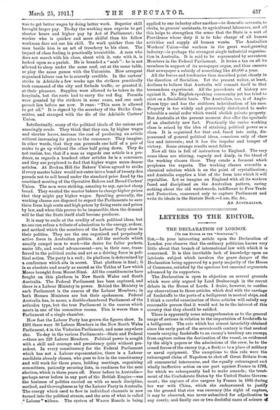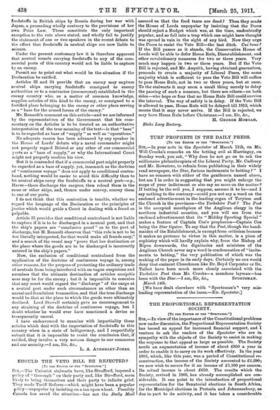LETTERS TO THE EDITOR.
THE DECLARATION OF LONDON.
(To TUX EDITOR or THZ " SPECTATOR...1 SIR,—In your interesting article upon the Declaration of London you observe that the ordinary politician knows very little about that branch of international law with which it is concerned. It is this inevitable lack of knowledge upon an intricate subject which involves the grave danger of the Declaration being approved by a party majority of the House of Commons, satisfied by the specious but unsound arguments advanced by its supporters.
The Declaration is open to objection on several grounds which were ably argued by Lord Desborough in the recent debate in the House of Lords. I desire, however, to confine my observations to those articles which deal with the carriage of foodstuffs to the ports of a belligerent in neutral ships, and I think a careful examination of these articles will satisfy any reasonable person that it would not be to the interest of this country that they should be ratified.
There is apparently some misapprehension an to the general usage of nations in relation to the importation of foodstuffs to a belligerent. The rule which has almost invariably obtained since the early part of the seventeenth century is that neutral vessels carrying foodstuffs to an enemy's territory are exempt from capture unless the destination of the vessel, as evidenced by the ship's papers or the admissions of the crew, be to the armed forces of the enemy (e.g., a fleet) or to a place of military or naval equipment. The exceptions to this rule were the extravagant claim of Napoleon to shut off Great Britain from all commercial intercourse, and the equally extravagant and wholly ineffective action on our part against France in 1793, for which we subsequently had to make amends ; the treat.. ment of the Confederate States by the United States Govern- ment; the capture of rice cargoes by France in 1885 during her war with China, which she endeavoured to justify on the ground that rice was currency (the right of capture, it may be observed, was never submitted for adjudication to any court); and finally one or two doubtful cases of seizure oe
foodstuffs in British ships by Russia during her war with Japan, a proceeding wholly contrary to the provisions of her own Prize Law. These constitute the only important exception to the rule above stated, and wholly fail to justify the statement of one or two speakers in the recent debate to the effect that foodstuffs in neutral ships are now liable to seizure.
Under the present customary law it is therefore apparent that neutral vessels carrying foodstuffs to any of the com- mercial ports of this country would not be liable to capture by an enemy.
Permit me to point out what would be the situation if the Declaration be ratified.
Articles 33 and 34 provide that an enemy may capture neutral ships carrying foodstuffs consigned to enemy authorities or to a contractor (commerfant) established in the enemy country who, as a matter of common knowledge, supplies articles of this kind to the enemy, or consigned to a fortified place belonging to the enemy or other place serving as a " base for the armed forces of the enemy."
Mr. Renault's comment on this article—and we are informed by the representatives of the Government that his com- mentary on the Articles is to be treated as an authoritative interpretation of the true meaning of the text—is that " base" is to be regarded as base of " supply " as well as "operations."
No adequate reason has been advanced by any speaker in the House of Lords' debate why a naval commander might not properly regard Bristol or any other of our commercial torts as a " base of supply," or why the International Court might not properly confirm his view.
But it is contended that if a commercial port might properly be regarded as a base of supply, yet, inasmuch as the doctrine of " continuous voyage " does not apply to conditional contra- band, nothing would be easier to avoid this difficulty than to let neutral ships carry the foodstuffs to a neutral port—e.g., Havre—there discharge the cargoes, then reload them in the same or other ships, and, thence under convoy, convey them to one of our ports.
I do not think that this contention is tenable, whether we regard the language of the Declaration or the principles of justice which would guide a Court in dealing with a fraud so palpable.
Article 3.5 provides that conditional contraband is not liable to capture if it is to be discharged in a neutral port, and that the ship's papers are "conclusive proof " as to the port of discharge, but M. Renault observes that "this rule is not to be too literally interpreted, for that would make all frauds easy," and a search of the vessel may "prove that her destination or the place where the goods are to be discharged is incorrectly entered in the ship's papers."
Now, the exclusion of conditional contraband from the application of the doctrine of continuous voyage is, among other reasons, for the purpose of protecting the ordinary trade of neutrals from being interfered with on vague suspicions and surmises that the ultimate destination of articles ancipitis uses may be for the enemy ; but it is impossible to conceive that any court would regard the " discharge " of the cargo at a neutral port under such circumstances as other than an unreal and fraudulent transaction, and that the true discharge would be that at the place to which the goods were ultimately destined. Lord Stowell certainly gave no encouragement to any straining of the doctrine of continuous voyage, but I doubt whether he would ever have sanctioned a device so transparently unreal.
I have endeavoured to examine with impartiality these articles which deal with the importation of foodstuffs to this country when in a state of belligerency, and I respectfully submit that it is impossible to resist the conclusion that, if ratified, they involve a very serious danger to our commerce and our security.—I am, Sir, &c., L. A. ATHERLEY-JONES.











































 Previous page
Previous page